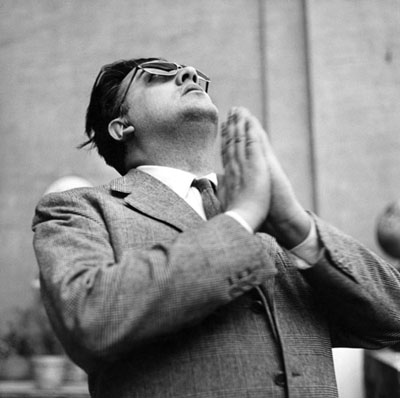“To savor Federico Fellini it may be worthwhile to temporarily spurn him,” suggests Gary Giddins, writing for Criterion. “We come to him in youth, rosily impressionable, hungry for allegory, susceptible to the idea of life as a circus, complete with and even dominated by a freak show. But then we must disown him like a shameful memory: the grandiosity, nostalgia, and hallucinations; the promenade of lanky, bosomy, and Chaplinesque women; the transvestites and gargoyles—so that later we can, with trepidation and longing, confront again the colorful ringmaster from Rimini and his forty-year pilgrimage in cinema, and find that we were right the first time, that Fellini really is an artist for most seasons.”
At RogerEbert.com, Glenn Kenny finds Arrow’s “Boro Box,” collecting five features and fifteen shorts by Walerian Borowczyk and lots of relevant reading, to be “a head-spinning crash course in the works of a filmmaker who’s not easy to like—he’s not nearly as intellectually adroit or witty as, say Luis Buñuel, to name a cinematic provocateur who was a major influence on Borowczyk—but whose ability to appall and exhilarate and to make one fall sideways laughing at erotic absurdity will certainly find appreciation from anyone whose taste for the Psychotronic runs to extremes.”
Aliza Ma at Reverse Shot: “Highly artificial, the mise-en-scène of Shutter Island makes a pageant of 1950s American iconography: the environment inside Ashecliffe is hued in pallid Formica shades and Daniels’s visions are saturated in patina jewel tones. While the amplified aesthetic may seem ahistorical—the film has been criticized for being a garish postmodern pastiche—Scorsese uses these cinematographic properties to dredge up the conspiracy-addled undercurrents in the period (a time when the director would have been an impressionable young teen), to recreate a certain psychological atmosphere rather than fashion physical verisimilitude. At the time of this writing, it is Scorsese’s last feature to be shot entirely on film.”
For BOMB, June Stein talks with Cherien Dabis about Amreeka (2009) and more.
IN OTHER NEWS
SXSW has announced a first round of speakers, panels, mentors (I’ll be one) and Convergence programming. Keynote speaker #1: Mark Duplass.
We Tell Ourselves Stories In Order to Live, the first and only documentary about Joan Didion, is a Kickstarter project launched by Griffin Dunne and Susanne Rostock
“With little over a week left until it gets under way, the 55th Thessaloniki International Film Festival [October 31 through November 9] has unveiled its full line-up,” reports Joseph Proimakis for Cineuropa. “Kornel Mundruczo’s Cannes contender, White God, will be opening the gathering, while Roy Andersson’s Venice winner, A Pigeon Sat on a Branch Reflecting on Existence, will close a program consisting of over 160 features from global independent cinema.”
GOINGS ON
New York. Michael Atkinson in the Voice on Industrial Terror, opening Friday and running through Halloween: “Easily the most inspired film-geek retro idea to land in New York since Anthology’s one-eyed-auteur series in 2009, this Halloween-angled suite revisits classic horror indies directed by erstwhile industrial filmmakers—and buttresses them with the ephemeral junk the filmmakers manufactured in their day jobs. Right away we’re reawakened to the fact that the vast majority of films shot in the 20th century—an indisputable lion’s share of cinema history—were disposable non-theatrical shorts assembled for industrial, educational, promotional, corporate, or even religious training purposes.”
And the L has seven recommendations for the next seven days.
London. Tomorrow evening, Iain Sinclair will be at the London Review Bookshop to discuss his project 70×70: Unlicensed Preaching with novelist and filmmaker Chris Petit and composer Susan Stenger.
IN THE WORKS
Abbas Kiarostami is “making a movie in China about a cleaning lady taking care of thousands of rooms in a big building,” Juliette Binoche tells Indiewire‘s Greg Cwik.
Stephen Frears will direct Meryl Streep and Hugh Grant in Florence, reports EW‘s Teresa Jue. Streep will play “the real-life New York heiress Florence Foster Jenkins, whose dreams of becoming a renowned opera singer are stymied by her laughable lack of talent. Grant will play her live-in partner and manager, the English actor St. Clair Bayfield, who guides Jenkins away from the real truth, which proves challenging when Jenkins decides to perform live at Carnegie Hall.”
OBIT
New Yorker editor David Remnick remembers Ben Bradlee, who edited the Washington Post from 1968 to 1991: “Younger people watching the actor Jason Robards’s portrayal of Bradlee in All the President’s Men can be forgiven for thinking it is a broad caricature, an exaggeration of his cement-mixer voice, his cocky ebullience, his ferocious instinct for a political story, and his astonishing support for his reporters. In fact, Robards underplayed Bradlee.”
ENDNOTES
Listening (33’15”). From Karina Longworth, You Must Remember This #19: Raquel Welch, From Pin-up to Pariah.
Parque Central will be a “portrait of Antigua, Guatemala and the children from faraway villages who work in the city’s central park to make ends meet”
More listening (124’31”). Slava Tsukerman discusses Liquid Sky (1982) in the Projection Booth.
For news and tips throughout the day every day, follow @KeyframeDaily. Get Keyframe Daily in your inbox by signing in at fandor.com/daily.




